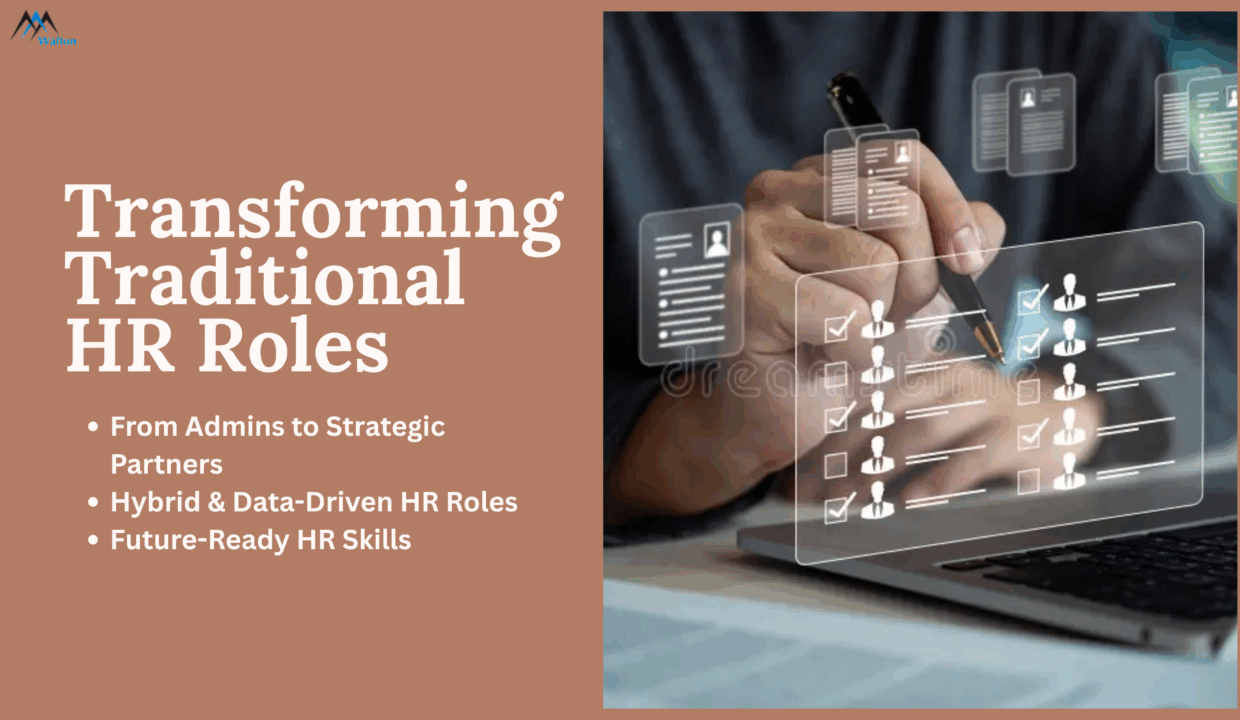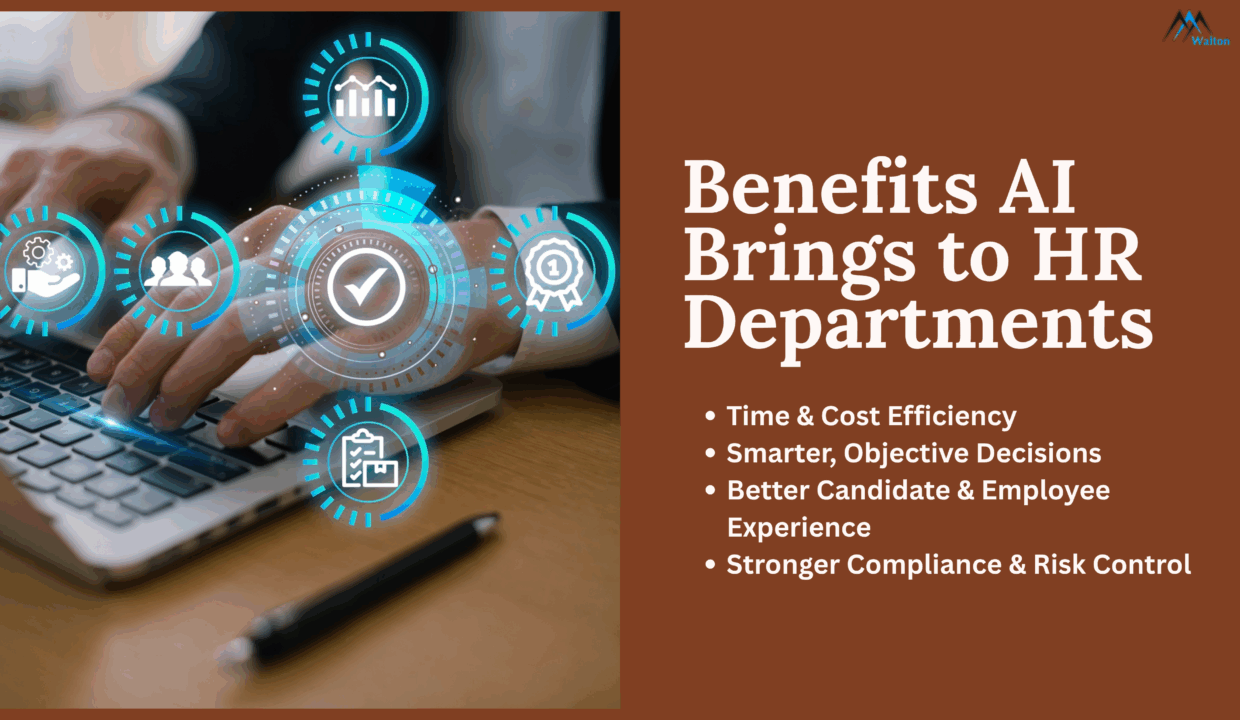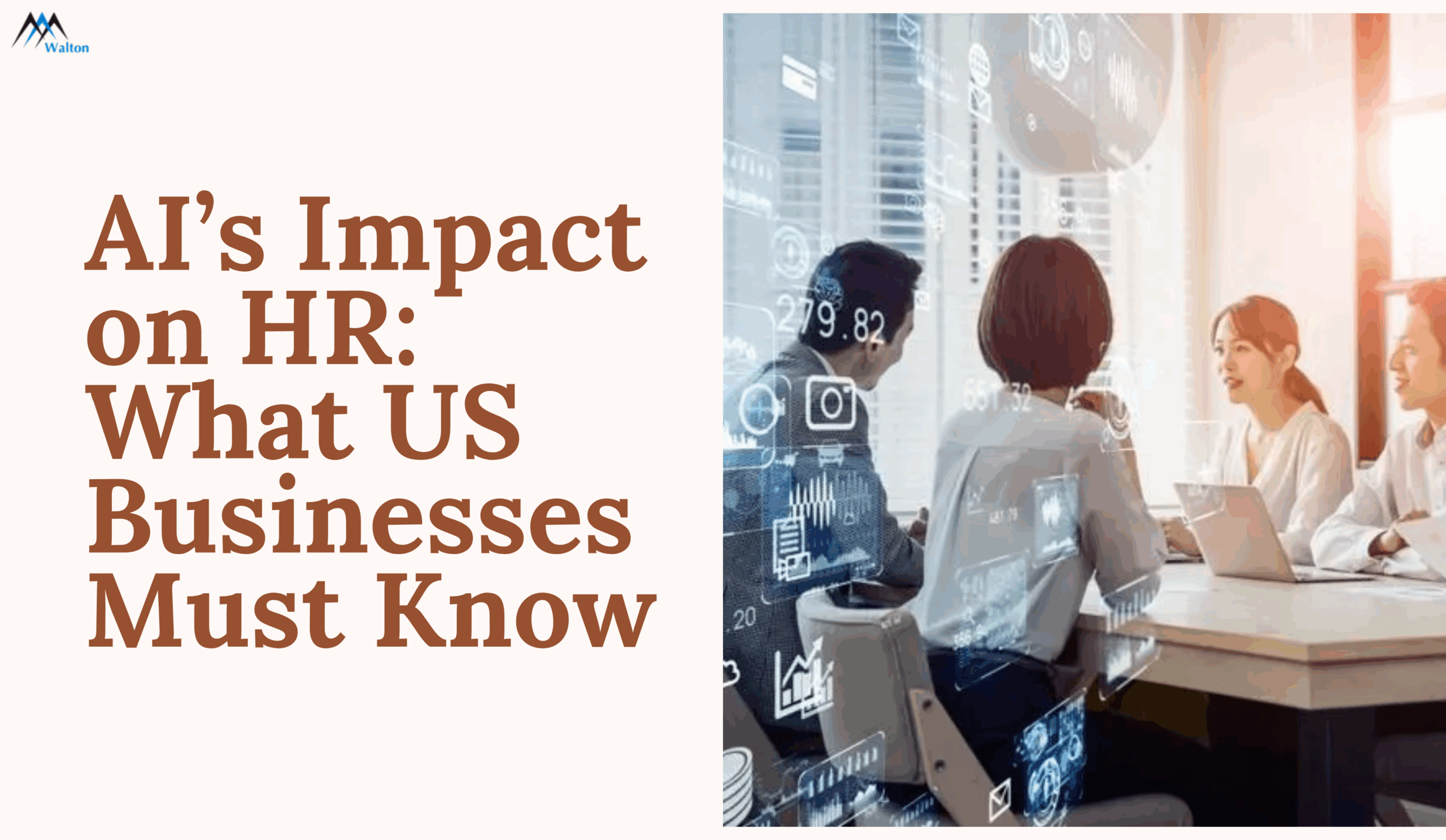Introduction
Artificial Intelligence (AI) is no longer just a buzzword in Silicon Valley; it’s transforming how businesses operate across every industry, including Human Resources (HR). In the U.S., where workforce dynamics are evolving faster than ever, HR departments are under increasing pressure to adapt, automate, and act strategically. AI is emerging as a powerful ally, not only streamlining repetitive tasks through HR automation and advanced AI tools for HR, but also enhancing decision-making, employee engagement, and long-term HR transformation and workforce planning driven by cutting-edge HR technology.
For business leaders and HR professionals alike, understanding how AI is reshaping traditional HR roles is no longer optional; it’s essential. From HR automation in candidate screening to analyzing employee sentiment in real-time using advanced AI tools for HR, this wave of HR technology is rapidly driving a profound HR transformation, redefining what it means to manage people in the digital age.
In this article, we’ll break down the key ways AI is transforming HR functions in the U.S., the opportunities and risks that come with it, and what every business needs to consider when planning their workforce strategy. We’ll also explore how experienced partners like Walton Management Services are helping companies navigate this transition by integrating technology with workforce compliance, hiring incentives, and AI-powered payroll and HR solutions.
The Current State of HR in the U.S.
The role of Human Resources in American businesses has evolved dramatically over the past decade. Once centered around administrative functions like payroll and compliance, HR departments are now expected to drive company culture, manage hybrid workforces, foster DEI (Diversity, Equity, and Inclusion) initiatives, and play a strategic role in long-term organizational growth. This ongoing HR transformation is being accelerated by innovations in HR technology, including AI tools for HR and HR automation, enabling teams to shift focus from manual tasks to more impactful, people-centric strategies.
HR Under Pressure: A Landscape in Transition
Post-pandemic shifts, ongoing labor shortages, and rapidly changing employee expectations have put HR teams at the center of business transformation. According to a 2024 report by Gartner, 77% of HR leaders say their function is under increasing pressure to become more agile and data-driven, yet many still rely on outdated systems and manual processes. Embracing HR automation, modern HR technology, and AI tools for HR is now essential to accelerate this HR transformation and meet the evolving demands of today’s workforce.
Today’s HR departments are expected to:
- Deliver a seamless experience across remote and in-office environments
- Analyze workforce data for better decision-making
- Ensure regulatory compliance across multiple states
- Recruit and retain top talent amid rising competition
All of this while maintaining employee trust, protecting sensitive data, and aligning with broader business objectives.
Traditional Systems Are Falling Behind
Legacy HR systems, especially those not built for digital operations, struggle to keep up with today’s demands. Manual reporting, siloed databases, and time-consuming onboarding processes are not only inefficient but also costly. As business models shift toward automation and personalization, HR must follow suit.
The shift isn’t just about efficiency, it’s about survival. Companies that fail to modernize HR processes risk falling behind in talent acquisition, employee retention, and compliance readiness.
This is where Artificial Intelligence is beginning to play a game-changing role, helping HR leaders move from reactive task management to proactive strategy execution. By leveraging AI tools for HR, HR automation, and cutting-edge HR technology, organizations are driving a deeper HR transformation that enables smarter, faster, and more strategic decision-making.
Where AI is Entering the HR Equation
Artificial Intelligence is not replacing HR, it’s redefining it. In recent years, AI has steadily made its way into nearly every stage of the employee lifecycle. From recruitment to retention, AI tools for HR combined with HR automation and next-gen HR technology are helping HR teams operate more efficiently, make smarter decisions, and personalize the employee experience at scale, driving a broader HR transformation across organizations.
Understanding the Basics: AI vs. Automation vs. Machine Learning
Before diving into practical applications, it’s important to clarify some terms:
- Automation refers to using technology to perform repetitive tasks with minimal human input (e.g., auto-sending onboarding emails).
- Artificial Intelligence (AI) mimics human reasoning to perform tasks like analyzing resumes or predicting attrition risk.
- Machine Learning (ML) is a subset of AI that improves over time by learning from data patterns—used in areas like resume ranking or predictive analytics.
While HR automation has long played a role in HR, advancements in AI tools for HR and machine learning (ML) now offer far more sophisticated capabilities through modern HR technology, going beyond time-saving to improving outcomes and accelerating true HR transformation.
Key Areas Where AI Is Reshaping HR
- Talent Acquisition and Candidate Screening
AI-driven applicant tracking systems (ATS), a prime example of AI tools for HR, can now scan hundreds of resumes in seconds, flagging top candidates based on job fit, experience, and even cultural alignment. Powered by advanced HR technology and HR automation, some tools use natural language processing (NLP) to assess soft skills or identify resume red flags that humans might miss, marking a significant step forward in HR transformation.
- Onboarding and Training
Virtual onboarding assistants and AI-powered learning platforms, key components of modern HR technology, personalize training modules based on an employee’s role, skill level, and learning style. By leveraging AI tools for HR and HR automation, this approach makes onboarding faster, more engaging, and more effective, contributing to a broader HR transformation that enhances employee development from day one.
- Payroll, Benefits, and HR Operations
AI is increasingly being used in HR operations, driving HR automation in areas like payroll, benefits management, and time-off requests. Leveraging advanced HR technology and AI tools for HR, chatbots and virtual assistants can now handle routine HR queries, freeing up human teams for more strategic work and accelerating the pace of HR transformation within organizations.
- Performance Management and Predictive Analytics
AI tools for HR can track KPIs, gather 360-degree feedback, and provide predictive insights into performance trends. Integrated with modern HR technology and supported by HR automation, these capabilities enable data-backed talent development plans rather than relying on subjective annual reviews, paving the way for a more strategic and impactful HR transformation.
- Employee Engagement and Sentiment Analysis
Using sentiment analysis and natural language processing, AI can evaluate survey responses, emails, and chat data to gauge employee morale and flag potential disengagement risks early.
According to a 2023 Deloitte report, 41% of U.S. organizations are already using AI-powered tools for some part of their HR function, and that number is expected to rise sharply in the next 2–3 years.
These innovations are not only driving HR transformation and reshaping how HR works through HR automation and advanced HR technology, but also creating new possibilities for business leaders to align talent with strategy more effectively, powered by intelligent AI tools for HR.
Transforming Traditional HR Roles
AI isn’t just reshaping HR tasks; it’s redefining HR roles altogether. As intelligent systems powered by HR automation and AI tools for HR take over routine processes, HR professionals are shifting away from purely administrative functions and moving toward more strategic, data-informed responsibilities, marking a significant evolution in HR technology and accelerating comprehensive HR transformation across organizations.

From Administrators to Strategic Business Partners
In a traditional model, HR teams often spend the bulk of their time managing paperwork, compliance tracking, or handling repetitive employee requests. With AI handling these tasks more efficiently, HR professionals now have the opportunity to focus on higher-impact areas like:
- Organizational design and workforce planning
- Employee experience and well-being
- Talent strategy aligned with business goals
- Data interpretation for better decision-making
This shift, driven by HR automation, advanced HR technology, and intelligent AI tools for HR, elevates HR’s role within the company from a support function to a strategic advisor to the C-suite, solidifying its position at the heart of ongoing HR transformation.
The Rise of Hybrid and Data-Driven Roles
New HR technology means new job titles and skill sets. As AI tools for HR and HR automation become more widespread, businesses are increasingly hiring for roles that blend traditional HR expertise with data fluency and digital literacy, further accelerating the pace of HR transformation. These include:
- HR Data Analyst – Experts who extract insights from workforce analytics to inform hiring, training, and retention strategies.
- Employee Experience Designer – Professionals who craft personalized, AI-enhanced employee journeys across the lifecycle.
- People Operations Manager – Leaders focused on integrating AI tools with broader HR systems and ensuring seamless user adoption.
These emerging roles require not just HR knowledge, but also comfort with AI tools for HR, such as dashboards, predictive models, and HR automation platforms, skills that are becoming essential in navigating today’s evolving HR technology landscape and driving meaningful HR transformation.
Skills of the Future for HR Professionals
To stay competitive in this evolving environment, HR professionals must build capabilities in:
- Data analysis and interpretation
- Technology evaluation and implementation
- Agile thinking and change management
- Ethical AI oversight and governance
Forward-thinking organizations are already investing in upskilling programs for their HR teams, preparing them to thrive in a blended human-and-machine workforce powered by HR automation, AI tools for HR, and cutting-edge HR technology, a critical step in sustaining long-term HR transformation.
This is where expert guidance becomes crucial. Firms like Walton Management Services help organizations assess where their HR teams stand today and what capabilities they’ll need to stay ahead of the curve.
The Benefits AI Brings to HR Departments
AI isn’t just a tool for reducing manual workload; it’s a catalyst for transforming how HR delivers value across the organization. For U.S. businesses facing rising labor costs, high turnover, and growing compliance demands, the integration of AI tools for HR, HR automation, and modern HR technology offers several key advantages driving a smarter, leaner, and more responsive HR transformation.

1. Time and Cost Savings
By leveraging HR automation to handle routine tasks like resume screening, interview scheduling, and payroll processing, AI tools for HR help teams recover hours of lost productivity. Supported by advanced HR technology, this shift enables HR professionals to move beyond administrative busywork and focus on more strategic initiatives like employee engagement, talent development, and long-term workforce planning, driving meaningful HR transformation. Automating these processes, as highlighted in the comparison between HR software and manual methods, can lead to greater efficiency, fewer errors, and significant reductions in operational costs.
A McKinsey study found that AI and automation can reduce HR operational costs by up to 30%, especially in areas like talent acquisition and workforce management.
2. Smarter, More Objective Decision-Making
AI algorithms, when properly trained, can reduce unconscious bias in hiring by focusing solely on data-driven indicators of job performance. Tools that assess skills, experience, and behavioral traits help eliminate subjectivity and promote a fairer hiring process.
Additionally, AI tools for HR can analyze performance trends and engagement data, enabling managers to make better, data-driven decisions about promotions, training, or timely interventions before issues escalate. Integrated with HR technology and supported by HR automation, these insights play a crucial role in advancing strategic workforce planning and accelerating overall HR transformation.
3. Improved Candidate and Employee Experience
AI-powered chatbots can engage with job candidates 24/7, answer FAQs, and keep them updated throughout the application process. Internally, personalized learning platforms and digital assistants can help employees navigate benefits, training, and policies with ease without waiting for HR responses.
This leads to a smoother, more responsive employee experience driven by HR automation, intelligent AI tools for HR, and modern HR technology, which is crucial in today’s competitive labor market and central to successful HR transformation efforts.
4. Enhanced Compliance and Risk Management
AI can monitor compliance with federal and state labor laws by flagging anomalies in timekeeping, overtime, or classification. It can also track mandatory training completions and generate audit-ready documentation critical for avoiding costly penalties.
This is especially valuable for multi-state employers dealing with complex, evolving regulations where HR automation and AI tools for HR powered by advanced HR technology can help ensure compliance, reduce risk, and support scalable HR transformation across diverse jurisdictions.
5. Real-Time Workforce Insights
AI can turn massive amounts of HR data into actionable insights. Whether it’s identifying departments with high turnover, predicting skills gaps, or measuring engagement sentiment, AI tools for HR enabled by HR technology and supported through HR automation give HR leaders the intelligence they need to act proactively rather than reactively, driving more informed decisions and accelerating HR transformation across the organization.
Challenges and Risks to Watch
While AI offers transformative benefits in HR, its adoption also introduces serious considerations. U.S. businesses must be mindful of legal, ethical, and operational risks that can emerge without a carefully designed implementation strategy. As HR automation, AI tools for HR, and advanced HR technology become more widespread, responsible deployment is essential to ensure that HR transformation is not only effective but also fair, compliant, and sustainable.
1. Algorithmic Bias and Fairness Concerns
AI tools for HR are only as unbiased as the data they’re trained on. If historical hiring data contains patterns of discrimination based on gender, race, or age, these systems, despite leveraging advanced HR technology and HR automation, can unintentionally replicate or even amplify those biases. In 2018, Amazon famously scrapped an AI recruiting tool that showed bias against female candidates, serving as a cautionary example of the ethical challenges companies must navigate during HR transformation.
To avoid this, HR leaders must:
- Regularly audit AI systems for fairness
- Use diverse, representative training data
- Include human oversight in decision-making loops
On May 18, 2023, the U.S. Equal Employment Opportunity Commission (EEOC) issued “Assessing Adverse Impact in Software, Algorithms, and Artificial Intelligence Used in Employment Selection Procedures Under Title VII”, emphasizing that employers can be held liable for adverse impacts caused by AI tools, even those developed or administered by third parties. This position was further reinforced in a 2024 EEOC case involving Workday, where the agency made it clear that third-party AI vendors are not exempt from federal anti-discrimination laws.
2. Overreliance on Automation
When companies allow AI tools for HR to handle all employee interactions, especially in sensitive areas like hiring or termination, they risk depersonalizing the workplace. While HR automation and HR technology offer efficiency, AI lacks the nuance and empathy required to navigate complex human issues. To ensure a responsible HR transformation, businesses should design systems where automation supports, rather than replaces, thoughtful human judgment and interpersonal connection.
3. Data Privacy and Compliance Risks
AI-powered HR tools process a massive volume of sensitive data health records, demographic details, and behavioral insights. As organizations adopt HR automation and advanced HR technology, the need for clear data governance becomes critical. Without well-defined policies, businesses risk violating privacy laws like the California Consumer Privacy Act (CCPA) or General Data Protection Regulation (GDPR), potentially undermining the trust and integrity essential to a responsible HR transformation powered by AI tools for HR.
Privacy risks include:
- Unlawful surveillance
- Mishandling of protected information
- Exposure to cyberattacks and legal penalties
4. Internal Resistance and Adoption Challenges
AI implementation often fails not because of the technology, but because of people. Some HR professionals may fear job loss or lack the necessary training to use AI tools for HR, HR automation, or other forms of advanced HR technology effectively. Without proper change management and a supportive culture, even the best tools can face low adoption or misuse, ultimately stalling or derailing the intended HR transformation.
That’s why successful companies take time to educate, reskill, and empower their HR teams, building confidence around AI rather than fear.
How U.S. Businesses Can Prepare and Adapt
Adopting AI in HR isn’t just about plugging in new tools; it requires rethinking how your company manages people, data, and compliance. Embracing HR automation, AI tools for HR, and forward-looking HR technology is only part of the equation. Businesses that proactively equip their teams and strategies for this broader HR transformation will be more resilient, competitive, and future-ready.
1. Conduct an HR Technology Audit
Start by evaluating your current HR systems:
- Which processes are still manual or repetitive?
- Are your data systems connected, secure, and insightful?
- What friction exists between compliance, hiring, and retention?
A technology audit helps identify opportunities for HR automation, improved insights through AI tools for HR, and streamlined operations powered by modern HR technology, laying the groundwork for a successful and scalable HR transformation.
2. Upskill and Educate HR Teams
AI is only as useful as the team implementing it. HR professionals now need to be fluent in:
- Data analysis and visualization
- Ethics of AI in the workplace
- Digital platforms for engagement and compliance
As reported in a 2023 global human capital survey, 87% of business leaders see workplace transformation as essential, but only 24% feel their organizations are prepared to execute those changes, exposing a clear readiness gap.
Focused reskilling through workshops, online programs, and mentoring can build essential expertise and adoption confidence, empowering HR teams to effectively use AI tools for HR, embrace HR automation, navigate new HR technology, and actively contribute to ongoing HR transformation.
3. Align AI Tools with Business Objectives
Avoid implementing AI tools for HR just for their novelty. These solutions should serve clear business goals such as reducing turnover, improving diversity, enhancing compliance, or boosting productivity. Whether it’s HR automation or broader HR technology adoption, prioritize vendors who offer ease of integration, scalability, and robust analytics support to ensure your HR transformation delivers measurable value.
4. Embrace Transparency and Change Management
Trust matters. Communicate openly with employees about:
- What AI will be used for and why
- How their data is collected, secured, and used
- What benefits does AI adoption bring to both individuals and the organization?
Designate internal ambassadors, hold feedback cycles, and foster a culture of informed adoption instead of fear, especially as HR automation, AI tools for HR, and new HR technology become central to driving successful and sustainable HR transformation.
5. Partner with Workforce Transformation Experts
Integrating AI into HR isn’t a one-size-fits-all process. Many organizations benefit from outside consultants who bring deep expertise in workforce optimization, legal compliance, and HR automation. These partnerships often enhance the effective deployment of AI tools for HR and advanced HR technology, accelerating implementation while avoiding costly missteps, ultimately supporting a smoother and more impactful HR transformation.
Final Thoughts: The Future of HR Is Already Here
AI is no longer a distant possibility; it’s actively reshaping how U.S. businesses attract, manage, and support their workforce. From intelligent recruitment and predictive analytics to HR automation, compliance tools, and employee experience platforms, AI tools for HR are becoming a central force in modern HR technology, driving a sweeping HR transformation across industries.
But with opportunity comes responsibility.
To thrive in this AI-powered era, HR leaders must look beyond tools and focus on alignment between technology, people, and purpose. It’s not about replacing humans with machines, but about enhancing human potential through smarter systems, better data, and more meaningful insights. When AI tools for HR, HR automation, and cutting-edge HR technology are applied thoughtfully, they become catalysts for a deeper, more human-centered HR transformation.
Whether you’re a growing startup or an established enterprise, the time to act is now.
For businesses seeking a partner in this journey, Walton Management Services offers specialized solutions in workforce analytics, tax credit optimization, and HR automation, helping organizations modernize without losing sight of compliance, cost efficiency, or employee well-being.

